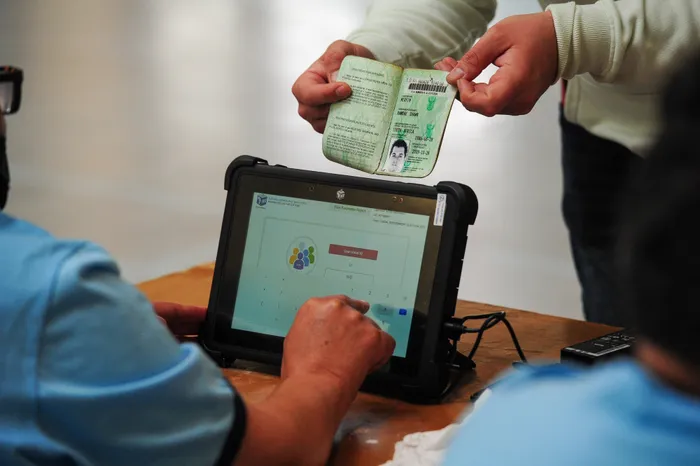Trust deficit in tech devices hits elections credibility

A Voter Management Device captures a voter’s details. They were used for the first time in the municipal elections of 2021 in South Africa. – Picture: Henk Kruger / African News Agency (ANA) / Taken November 1, 2021
By Sizo Nkala
South Africa’s recently concluded national and provincial elections have shone the spotlight on the role of technology in electoral and democratic processes. This was the first national election in which the Electoral Commission of South Africa (IEC) deployed digital devices, known as the voter management devices (VMD), across over 23 000 voting districts.
VMDs were first deployed during the 2021 local government elections to replace the so-called zip zip machines. They were used to capture voters’ information, including their residential addresses, update the data of registered voters and place voters in the correct section of the voters’ roll. VMDs were used by the IEC officials in voting stations to check voters’ information before they allow them in and to capture voters’ participation to prevent cases of voters casting their votes twice.
Such devices can indeed be a solution to the myriad problems that come with the management of data-intensive processes like national elections in ensuring fast and accurate processing of information while minimising possibilities of electoral fraud. However, in most voting stations around the country the IEC was forced to withdraw the VMDs as they malfunctioned and went offline, while some of the devices’ applications were not updated, which meant voters’ information could not be retrieved.
This was compounded by the IEC officers’ lack of experience in using the new devices. This left the IEC with no option but to instruct its officers to revert to the manual system. As a result of the technical glitches, the voting process was excruciatingly slow, with some voters having to cast their votes way past midnight.
Many others left the voting queues frustrated by the slow process and as such could not exercise their democratic rights. There were some claims that the IEC was deliberately slowing down the process to frustrate voters. However, the Commission denied these allegations.
South African voters went through a similar ordeal in the 2021 local government elections when the VMDs were first used. One would have thought the IEC would have learnt from the first experience to prevent the same problem happening again in the national elections.
South Africa’s experience demonstrated that while the infusion of technology in electoral processes is a brave and progressive idea, it also comes with its own risks that could negatively affect the quality and credibility of elections. The adoption of technology in electoral processes is a growing discourse in Africa, a continent where elections are usually marred by allegations of rigging.
Advocates of incorporating technology in elections argue that it would improve transparency and accountability – and by cheaper by drastically cutting down the costs associated with the massive logistics needed to run elections using traditional manual systems. Countries like Kenya, Zambia and Senegal have incorporated technology in their national elections to improve their credibility.
The Electoral Commission of Zambia has used biometric e-Poll books in its past elections to fast-track identity verification and prevent identity theft. These wi-fi-connected devices have been used to conduct voter registration, even in the most remote areas, and to update the central voter database.
A rights organisation in Senegal created a website which enabled voters to report events at polling stations in real time. Kenya’s Integrated Electoral Management System uses biometric technology for voter registration and voter identification which has improved the integrity of its voters’ roll.
However, most countries in Africa cannot afford incorporate digital technology in their electoral processes because of their prohibitive costs. Moreover, there is a lack of trust in the digital technologies, as many people believe they can be manipulated to influence the outcome of the elections.
South Africa’s uMkhonto we Sizwe Party, which had the third-biggest share of the vote, accused the IEC of deliberately taking the ICT systems down to manipulate the vote numbers.
Technology also works in aspects of elections other than the voting process. This includes mobilising voters, campaigning and disseminating important information. The Kenya Elections Transparency and Integrity Alliance created a website to report and locate election-related incidents across the country in the last elections. Google for Nigeria – an online platform – was developed to spread information about election related matters, including voter registration, polling stations and information on participating candidates.
With close to 400 million users in Africa, digital media such as Facebook, Twitter and WhatsApp, among others, is also playing an increasingly important role for election campaigns by circulating important information and mobilising of voters to participate.
However, some countries like Senegal, Ethiopia and the Democratic Republic of Congo have shut down the internet during the elections to stifle opposition parties and hide malpractices.
It is also important not to overstate the impact of digital technology in elections as Africa still suffers from widespread digital poverty, with the majority of its people lacking access to these technologies. Even a sizeable number of those who have access are not digitally literate.
Digital technology does have the potential to enhance Africa’s democracy. However, there is need for African countries to invest in digital infrastructure and adopt appropriate ethical standards if digital technology is to have an impact on elections.
Rolling out digital technology without adequate supporting infrastructure will only result in the disenfranchisement of voters and disputed electoral outcomes.
Dr Sizo Nkala Research Fellow at the University of Johannesburg’s Centre for Africa-China Studies